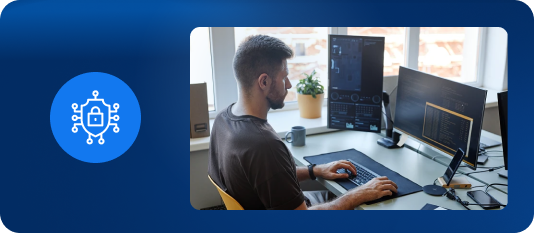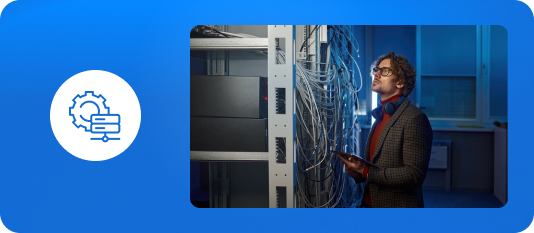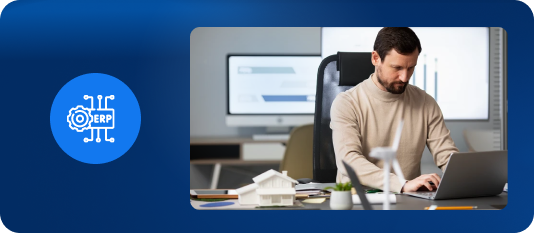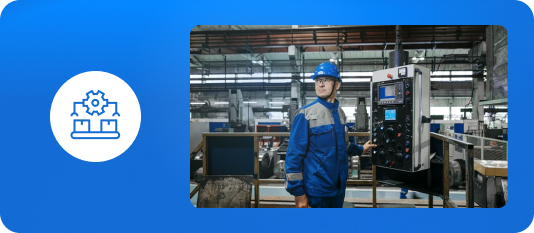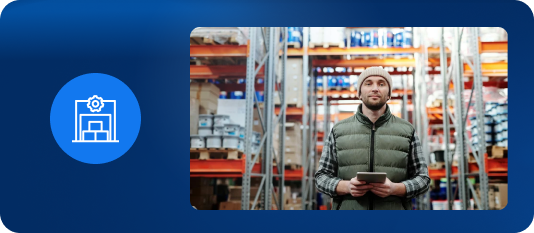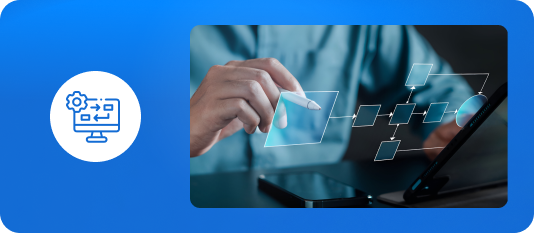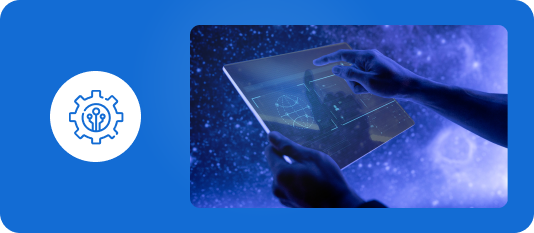CMS system and websites
Discover the potential of modern websites with an intelligent CMS
Build websites and manage content in a way that meets your real needs – quickly, flexibly, and without the need for dedicated programming. Choose solutions that allow you to effectively present your offerings, respond to customer needs, and thrive in the digital space. With a multi-portal CMS that adapts to your business model, you'll gain full control over your website, the ability to quickly update it, and access modern tools to support your online activities.

Choose a CMS system with functionalities tailored to the needs of your business
web360 Multiportal Platform
A CMS system for managing multiple portals, creating specialized websites, and providing e-services.
MoreEDU web360 Portals for Universities
A CMS system for higher education institutions that meets digital accessibility requirements.
MorePublic sector websites PUBLIC web360
A CMS system for the public sector for publishing information in accordance with digital accessibility standards.
MoreEnterprise websites ENTERPRISE web360
A CMS system for companies enabling central content management and integration with internal systems.
More
Ensure your website's functionality and digital accessibility
Utilize the potential of a modern CMS system that allows for easy implementation of accessibility standards compliant with WCAG (Web Content Accessibility Guidelines). Operate in a scalable content management environment that allows you to create clear, intuitive websites that meet the needs of people with various disabilities. Increase the visibility and effectiveness of your website, reaping tangible benefits from higher conversion rates and improved search engine rankings.
See how much you can gain with modern CMS systems
Take care of every aspect of your online presence with a well-designed and practical website
We support companies, universities, and institutions in managing online communications and building a strong, cohesive brand presence online. We provide modern tools and design scalable, functional websites that support the achievement of business and statutory goals. We offer a full range of services – from consulting and needs analysis, through implementation and integration, to ongoing technical support and the development of digital tools that support website-based image and marketing activities.
 Stage 1
Stage 1
 Stage 2
Stage 2
 Stage 3
Stage 3
 Stage 4
Stage 4
 Stage 5
Stage 5
 Stage 6
Stage 6
Manage your website conveniently and effectively
Improve communication by maintaining a consistent, professional image with advanced CMS tools for creating websites, landing pages, and other pages, as well as publishing engaging content. Choose technology that supports your brand's online presence, ensuring consistency, reliability, and a high-quality user experience at every stage of communication and collaboration.

High Conversion
Achieve sales results and engagement levels consistent with your business expectations.
Increased Visibility
Ensure your website's visibility with dedicated mechanisms that support content optimization and compliance with SEO best practices.
Real-Time Communication
Manage content whenever needed – conveniently, quickly, and transparently, using a variety of communication methods.
Content Personalization
Tailor your messages to different audiences and increase their engagement on your website.
Communication Consistency
Manage content across multiple pages and communication channels quickly and conveniently from a single administration panel.
Flexible Expansion
Smoothly adapt your websites to changing business and regulatory needs with scalable capabilities.
Discover the capabilities of modern CMS systems for website creation
We take a comprehensive approach to website development. We provide a stable technological framework that enables the efficient creation, management, and expansion of websites in a single, cohesive environment.
Communications
Manage press releases and current announcements regarding the organization's activities.
Offer
Present a full range of services and products to potential customers in a comprehensive and engaging manner.
Marketing
Run promotional campaigns, manage marketing content, and build lasting customer relationships.
Customer Service
Provide support materials, FAQs, contact forms, and self-help tools.
Education and Training
Publish courses and educational materials, and organize conferences, training sessions, and webinars.
E-commerce
Manage online sales of products and services from your website.
Articles
See the latest articles, expert advice, interviews, and reports related to the digitalization of processes and the latest technologies.
A properly selected CMS system guarantees a well-functioning and secure (...)
Contrary to popular belief, creating a website doesn't require (...)

Frequently asked questions about CMS systems
A CMS (Content Management System) is software that enables the creation, management, and updating of websites—including text, graphics, and video. Thanks to their extensive features, CMSs also enable the creation of domain-specific websites, such as intranets and extranets, official websites, recruitment platforms, academic websites, and online stores. Designed with users without programming knowledge in mind, they offer user-friendly and intuitive management panels and access to pre-built components, making them significantly easier to use.
CMS systems are used in a variety of environments – from e-commerce stores and corporate websites to government and local government institutions, which must meet specific accessibility and transparency standards. They are also used in the education sector, as well as in media and blogs. CMSs also prove useful as intranet solutions, supporting internal communication and knowledge management within organizations.
In terms of licensing, three different types of CMS systems can be distinguished. The first are open-source systems, meaning free tools with open-source code that is publicly available and modifiable by an unlimited number of users. The second are commercial systems with closed-source code, managed and licensed by the manufacturer, offering advanced functionality, technical support, and a high level of security. The third type are dedicated systems, custom-built from scratch and designed to meet the investor's specific requirements. These systems provide maximum flexibility and full control over functionality, but are associated with higher implementation and maintenance costs.
Open-source CMSs are ready-made, publicly available software for building a website and managing its content, which can be downloaded and installed independently. Their source code is open and modifiable by the entire user community. As a result, anyone can make changes to it, adapting it to the specific needs of a specific project. A commercial CMS, on the other hand, is a closed-source solution. The system's creators ensure its proper operation, updates, licensing, and security, while also offering technical support. Licensed users gain access to a wide range of components and functionalities that allow them to create, manage, and expand fully functional websites as needed.
Choosing the right CMS system should be preceded by a thorough analysis of the organization's needs and goals—both short-term and long-term. Determining the project's scale is also crucial, as it determines the scope of required functionality. Considerations should also include scalability and flexibility of the solution, the ability to integrate with existing systems and internal tools, the degree of customization, and compliance with applicable legal regulations, security standards, and accessibility standards. If the tool will be managed by employees without advanced technical backgrounds, it should be intuitive to use.
Modern CMS systems offer a range of benefits for both website owners and their managers. An intuitive interface makes it easy to use, even for those without specialized technical knowledge, speeding up content publishing and editing. Tools allow for the definition of roles and the assignment of individual permissions, supporting effective team management and security, as well as streamlining task execution. CMS systems also facilitate website positioning through the ability to configure metadata. Their scalability allows for expanded functionality as the website grows, and flexible personalization options allow for the complete alignment of the website's appearance with the brand's visual identity.
Modern CMS systems can provide a high level of security, provided they are properly implemented and configured. Regular updates are crucial, as they address detected vulnerabilities and strengthen the system's protection against threats. Mechanisms such as two-factor authentication and the ability to define detailed user roles and permissions also play a crucial role, effectively reducing the risk of unauthorized access.
Want to know more? Contact us
Let us know your needs and expectations, and our consultant will contact you. Together, we'll choose the best solutions for your business.

